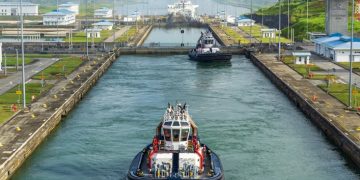Skuld Club has observed a significant increase in stowaway incidents which remain a persistent issue despite the adoption of the ISPS Code by many West African states.
According to Skuld, the methods used by stowaways are becoming more sophisticated, and their financial demands for repatriation raise concerns about their true motives. While some ports in the region assist with disembarking stowaways, others are less cooperative, citing concerns about the impact on their image and varying fines for security lapses.
Over the past five years, Skuld has noted the following:
- The number of stowaways per attempt has increased.
Previously often solitary or in pairs, today, many cases of stowaways involve several people, often four or five, who do not have specific connections with one another. - The main departure ports or areas are often Nigeria or Ghana.
- Container ships remain most exposed to this risk.
- Climbing aboard vessels often occurs at the port through connections with company employees authorised to board the ship during its call.
Embarkation can occur as the ship departs the port, with stowaways using a speedboat to board. They often reach the rudder and attempt to open and hide in the upper rudder compartment. - The use of fishing boats to try to board ships once at sea.
- Stowaways increasingly have financial demands regarding their repatriation, permitting them to doubt their real intention.
- Authorities at specific ports are quick to assist shipowners with the various formalities related to disembarking these stowaways, while others continue to categorically refuse any disembarkation in their ports, claiming that the IMO statistics record the port of disembarkation and not the country of origin of the stowaways, thus these statistics work against the good image of these ports.
- Some ports impose various fines, while others do not demand any payment other than covering certain costs. Fines by some port authorities are usually issued based on the alleged lack of security during the vessel’s call such as alleged negligence in recording visits on board.
- There is a lack of real coordination among the various states of the Gulf of Guinea to try to curb this stowing away by maritime means.
The table below provides a summary of the ports we operate. However, disembarking a stowaway is subject to the discretion of the authorities:
| Possibility in principle to disembark (A) | Fine (B) | Authorities costs to be covered | Sufficient embassies to obtain necessary documentation (C) | Escort for repatriation imposed (D) | |
| Gabon – Port Gentil | YES | YES | YES | YES | NO |
| Gabon – Port Gentil | NO | ||||
| Cameroon – Douala | YES | YES | YES | YES | NO |
| Cameroon – Kribi | YES | YES | YES | NO | NO |
| Cameroon – Limbe | NO | ||||
| Benin – Cotonou | YES | NO | YES | YES | YES |
| Togo – Lome | YES | NO | YES | YES | YES |
| Ivory Coast – Abidian | YES | YES | YES | YES | YES |
| Ivory Coast – San Pedro | NO | ||||
| Senegal – Dakar | YES if only boarded at Dakar | YES | YES | YES | NO |
| Gambia – Banjul | YES | NO | YES | YES | YES |
IMO guidelines:
Treatment of stowaways while onboard:
- Stowaway incidents shall be dealt with in a manner consistent with humanitarian principles. Due consideration must always be given to the operational safety of the ship and to the safety and well-being of the stowaways.
Disembarkation and return of stowaways:
- All parties involved shall cooperate to the fullest extent possible in order to resolve stowaway cases expeditiously and ensure that an early return
or repatriation of stowaways will take place. - Stowaways arriving at or entering a country without the required documents are, in general, illegal entrants. Decisions on dealing with such situations are the privilege of the country where such arrival or entry occurs.
- Stowaway asylum seekers shall be treated in accordance with international protection principles as set out in international instruments, such as the 1951 Convention and the 1967 Protocol relating to the Status of Refugees, and relevant national legislation.
- Every effort should be made to avoid situations where a stowaway has to be detained on board a ship indefinitely.
- Countries shall allow return of stowaways who have full nationality citizenship status in that country or have a right of residence in that
country. - Where the nationality or citizenship or right of residence cannot be established, the country of the original port of embarkation of a stowaway should accept the return of such a stowaway for examination pending final case disposition.




























































